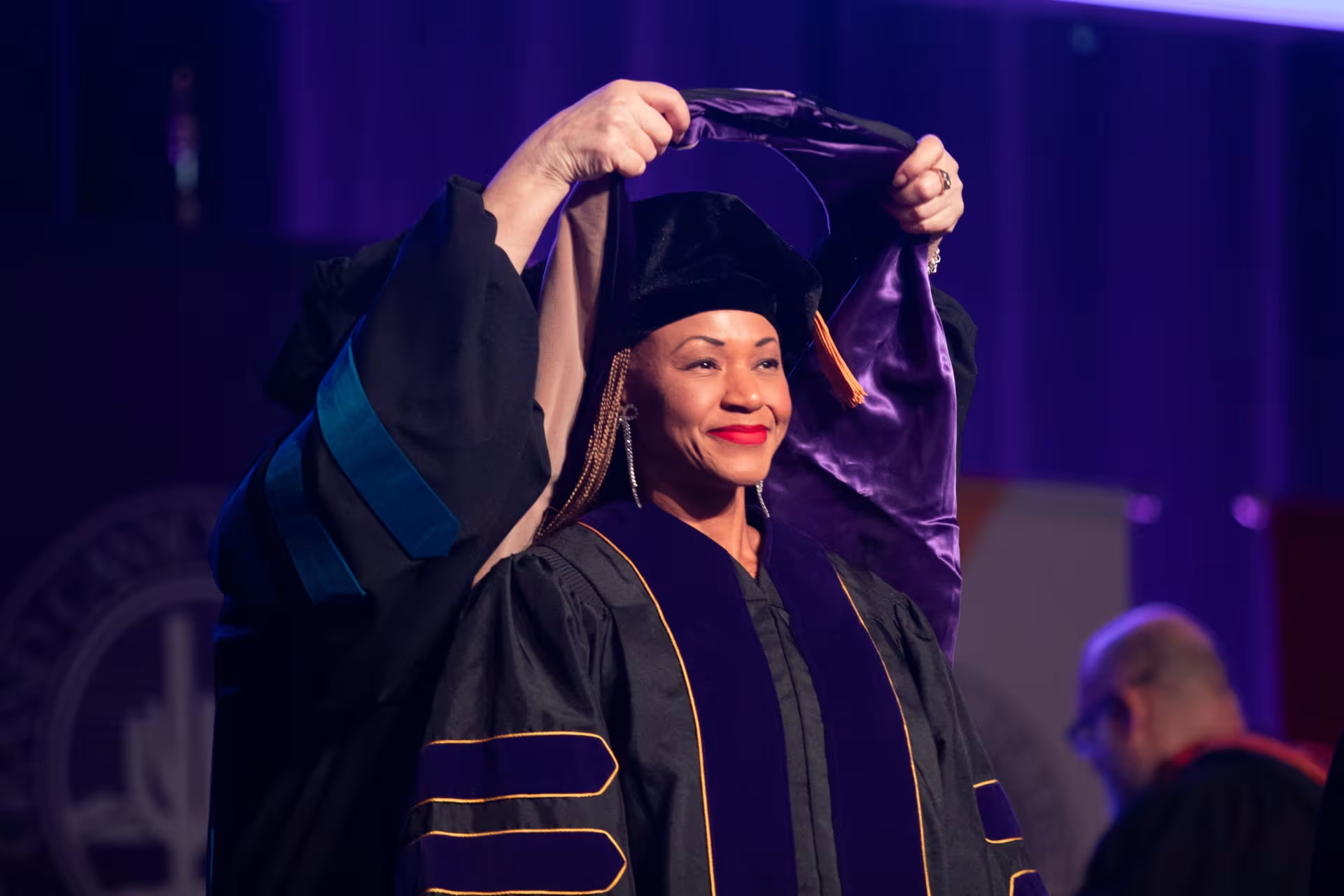


GCU’s PhD in Counselor Education and Supervision is offered online, which gives you the flexibility and convenience to work and complete your doctoral degree at the same time. In addition to our interactive digital learning platform, you can benefit from GCU’s other online resources, such as the Doctoral Community (DC) Network,(See disclaimer TM) which facilitates scholarly connections and collaboration.
In addition to your online coursework, you will attend in-person residencies where you will have access to doctoral faculty and peer feedback for your proposed dissertation research. GCU’s PhD in Counselor Education and Supervision online program is designed to be interactive with your peers and your program leadership through open, collaborative forums.
The Doctor of Philosophy (PhD) in Counselor Education and Supervision program at Grand Canyon University offers you the theoretical and practical background knowledge necessary to teach counseling students and supervise clinical counselors. Before earning a doctorate in counselor education and supervision, you must conduct original research to develop and test new ideas and theories. This research can potentially position you to become a practitioner who is capable of supporting counseling students and clinical counselors.

As a graduate of the PhD in Counselor Education and Supervision program, you may oversee clinical counselors and provide instruction and leadership when necessary.
No degree program can guarantee any specific career outcome. However, after earning your PhD, you may choose to stay in your current practice and apply the research and learning to improve the lives of your clients.
You may also choose to pursue a new career, such as:
Advanced clinician or mental health counselor
Faculty member or counselor educator
Counselor supervisor
Leadership positions in educational settings
Leadership positions in counseling settings
When you earn your doctorate at GCU, you will begin to work toward your dissertation throughout your program by working with a mentor, completing coursework, and completing residencies focused on the development of your original dissertation research.

Doctoral students pursuing GCU’s PhD with a qualitative focus will conduct research that focuses on describing how and why people think, believe and behave a certain way. Students pursuing GCU’s PhD with a quantitative focus will analyze original concepts by interpreting numeric data. To complete the data analysis for a PhD in Counselor Education and Supervision, you will create a sampling plan, design various research tools, collect data and analyze the data using a systematic approach. Your results and analysis will then be presented in a written dissertation.
Before choosing a doctoral program, it’s important to ensure that the university is accredited, which is a reflection of the quality of the school and academic offerings. GCU has been institutionally accredited by the Higher Learning Commission (HLC) since 1968 and proudly offers academic programs informed by industry and student learning outcomes.
You will complete a required dissertation that will conclude this program. You will begin to develop elements of your dissertation from the start of the program by expanding your idea for your original research project and concluding with conducting the research and analyzing your findings in dissertation courses with the guidance of your dissertation committee. Along the way, you’ll take courses in research and counselor education and supervision that prepare you for your dissertation defense by teaching analytical and communication skills. In addition, you must complete two in-person residencies and required internships to meet all graduation requirements.

On the path to supporting other counselors, you may examine how to improve your own practice and impact the health outcomes of your clients. Through coursework and research, residency, internship and program requirements, you may have the opportunity to demonstrate your professional growth. The combination of theoretical and hands-on work may help you prepare yourself for potential transition into the next stages of your career.
The College of Humanities and Social Sciences has outlined the six domains that highlight the goals of the PhD in Counselor Education and Supervision coursework.
Counseling
Examine and integrate ethical and culturally relevant theories of counseling
Supervision
Develop a legal, ethical and personally relevant style of clinical supervision
Teaching
Design, deliver and evaluate counselor education experiences
Scholarship and Research
Conduct independent research
Leadership and Advocacy
Lead and advocate based on prevailing social, cultural and political conditions and trends within counseling
Special Topics
Evaluate the integration of evidence-based treatments relevant to family systems and group dynamics and processes
Earning a PhD requires a considerable investment of resources and an enduring commitment to complete the program. Before applying to a doctoral program, conduct research to make informed decisions. The following frequently asked questions and answers provide a starting point for your research.
What are the admission requirements for the PhD in Counselor Education program?
Is it worth getting a PhD in Counselor Education and Supervision?
What is a counselor educator?
Does a PhD increase salary for counselors?
Do counselors need a PhD?
To learn more about time to completion and the dissertation process at GCU, visit our doctoral page.

If you are ready to prepare for teaching and supervising the next generation of counselors, fill out the form on this page to learn more about the counselor education and supervision degree program at GCU.
(See disclaimer §) MOU-Alumni 2000 Doctoral-Feb2026: The Alumni Scholarship for Doctoral Programs is only valid for those applicants who submit a complete application and begin a Doctoral program in February 2026. This scholarship cannot be used in conjunction with any other GCU scholarship or awards and only applies to online and evening programs. Please speak to a university counselor for complete details.